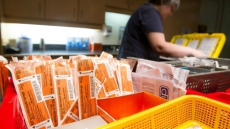TORONTO — With Parliament poised to look at changes to how temporary foreign workers are treated, people who came as live-in caregivers are speaking out about what they call injustices within the federal programs.
Kristina Torres, 28, came to Canada from the Philippines under a federal live-in caregiver program that she said has left her feeling "disposable" and less than human. Torres joined other caregivers in Toronto on Sunday to discuss allegations of exploitation in the program.
The federal initiative allowed families to hire someone from another country to live with them and provide care for children, seniors and people with medical needs or disabilities. After two years in the program, the caregiver could then apply to become a permanent resident.
The program was changed in 2014 so new applicants were no longer required to live in their employers' homes. But people already employed through the live-in program would continue in that stream, and couldn't apply for so-called "live-out" jobs. Along with that amendment, caregivers lost the right to apply for permanent resident status.
Federal programs involving temporary foreign workers have been no end of embarrassment for the government.
They've been criticized for giving Canadian jobs to foreign nationals, and leaving those foreign nationals in precarious work situations.
Reforms were made after a series of controversies, including reports of fast-food restaurants favouring temporary foreign workers over local employees. The Royal Bank also came under fire for cutting Canadian jobs while a new supplier it hired to provide technical support brought in foreign workers.
A Commons committee studied potential reforms to the programs this spring, and is expected to release its report after MPs return to Parliament Hill next week.
Many workers in the programs, such as Torres, are tied to the employer who brought them over — if they quit or are let go, they lose their living place and can't accept a job elsewhere without jumping through bureaucratic hoops.
"If we don't have an employer, we don't have a home," Torres said.
She said workers' hands are tied when their employers ask them to work unpaid overtime or do tasks that are outside of their job description. They can't decline without risking their job. Torres said she's had to agree to work that doesn't fall within the scope of her job, including fixing the caulking on an employer's bathroom floor.
"It was lucky I knew how to do it," she said.
But in 2014, when the program was in the midst of its overhaul, she was less lucky. She had been working for someone for a while, but she said she was let go a short time after she declined to help her employer renovate — something that was completely outside of her job description. She said she thinks her refusal is what triggered her termination.
Torres had to apply for a new work permit, and said she was rejected several times before finally being accepted.
The process was completely different from what she expected, she said. When she first applied for the program — years ago — she was promised a "pathway to permanent residency."
But no such pathway existed for her.
"You just collapse from all those expectations that you have, hoping that you'll have a good life in Canada," she said. "And then you're treated as less than a human being."
On Sunday, Immigration Minister John McCallum told CTV's Question Period that he hopes to reform the system to bring back that "pathway to permanent residence."
But Torres said that's not good enough. She's part of an advocacy organization called the Caregivers Action Centre, which is calling for temporary workers and their families to be given permanent resident status upon their arrival in Canada.
Torres said that's the best way to get rid of employers' attitudes that foreign caregivers are disposable.
"Any two-step process or path to permanent residency is really a path to exploitation. It's a minefield: we need permanent status on arrival,” she said.
She said exploitation is rampant in the program.
"We're expected to be robots," she said. But the work is hard and emotional.
In her experience working with people who are gravely ill, Torres said, she has to do the physical work of helping her client, but she also has to navigate the shifting family dynamics that come near the end of life. And there's no respite at the end of the day, as workers are fully immersed in their employer's family.
And she said live-out programs aren't much better.
She said that even if someone says they're looking for a live-out caregiver, many still expect their employees to live with them.
"A lot of employers won't hire you," Torres said, "because they're looking for that willing candidate to be abused."





